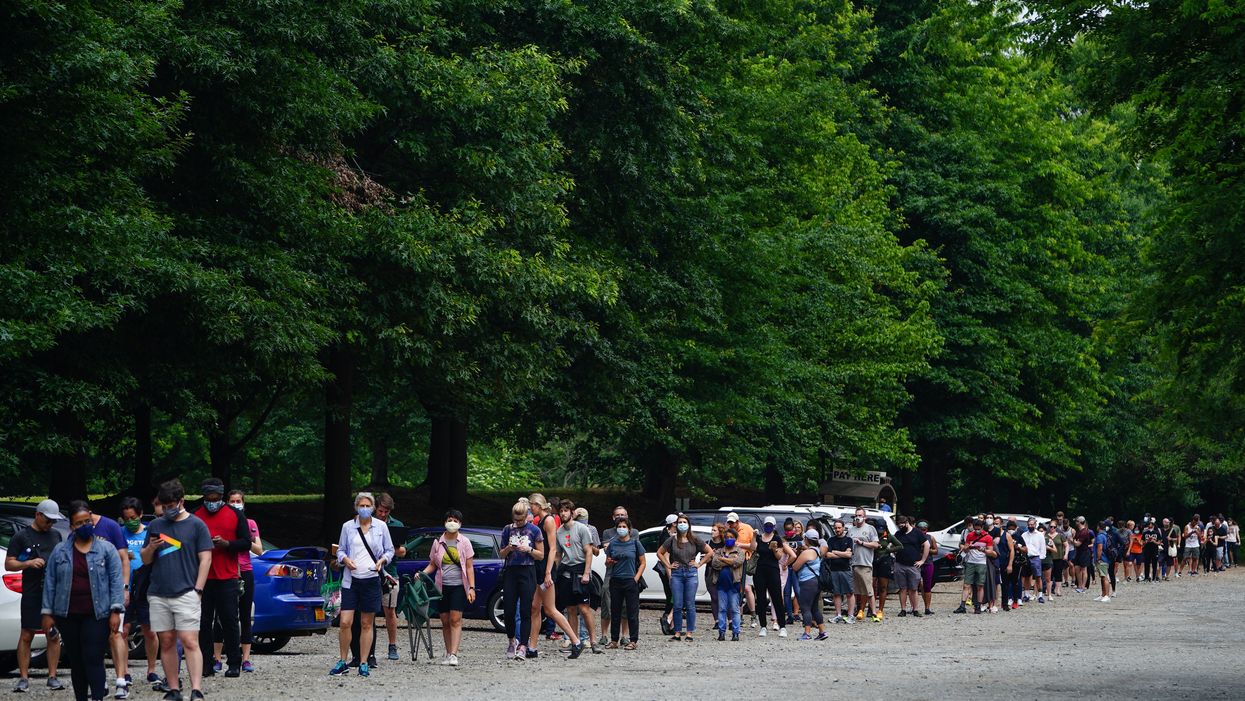Benson is Michigan's secretary of state and Underwood, a fellow Democrat, is a congresswoman from Illinois. Firestone and Palfrey are attorneys with the Voter Protection Corps.
After a series of deeply disrupted spring elections, it's clear that Covid-19 is the latest threat to voting rights in America. Many advocates and election officials, ourselves included, are working to expand vote-by-mail, which reduces risks of transmission of the coronavirus and can increase turnout. In recent primaries, mail-in voting rates have skyrocketed by 10 or even 20 times.
But protecting the November election requires an all-of-the-above approach that keeps polling places open. If we fail to act, we will disenfranchise the same Americans historically excluded from voting.
In the last presidential election, three-quarters of all Americans who cast a ballot — nearly 110 million people — did so in person at an early voting site or on Election Day. Members of historically marginalized groups voted in person at even higher rates. In a 2018 census report, Black Americans were the most likely racial group tracked to participate in in-person voting, at 88 percent, and the least likely to vote through the mail. Native Americans, younger voters with less stable mailing addresses, the homeless, voters with disabilities and those who need language assistance all use in-person voting more heavily.
Unfortunately, in primary after primary this spring, election officials have restricted or interfered with in-person voting, particularly in urban areas.
For Wisconsin's primary, Milwaukee slashed the number of polling locations open April 7 down to just five — down from 180. While turnout across the rest of the state dropped 4 percent from the 2016 presidential primary, turnout in the state's largest city dropped 37 percent.
Before Pennsylvania's primary June 2, Philadelphia eliminated 600 voting sites, citing poll worker shortages. A curfew that cut into voting hours was lifted only hours before polls opened. Turnout in the city dropped by 30 percent compared to 2016, six times the rate across the rest of the state.
During the April 9 primary in Georgia, thousands of voters in Atlanta were forced to wait in hours-long lines. Two weeks later in Kentucky, election officials opened just one in-person location in each county, causing concern about the potential for long lines impacting citizens voting in person especially in Louisville and Lexington, the state's most urban and diverse places.
Without preparation, we'll see the same dysfunction play out across the country 13 weeks from now. To ensure that voters are protected this fall, state and local officials must prepare now. Here are the most important four steps to take.
Keep neighborhood polling locations open. Closing polls creates longer lines, bigger crowds and higher risks. Officials should commit not to close polls and consolidate voting, which disproportionately impacts voters in urban areas. The vast majority of the country's Election Day voting places are multi-functional locations and the majority are controlled by local governments.
Election officials should begin planning now to reconfigure or relocate these locations and ensure all have access to cleaning supplies, hand sanitizer and protective materials. States and localities should also expand curbside voting, allowing voters in need to stay in their cars.
Recruit, train and protect new poll workers. This is a watershed moment to invite new generations to fill a critical civic role, including some of the millions of Americans who have joined peaceful protests. But we have to start asking now.
This spring, the coronavirus led to massive shortages of poll workers, and a 2017 report found that most jurisdictions already struggled to recruit the workers needed. In the last presidential election, more than half of the country's 918,000 poll workers were older than 60. Election officials need to create simple online sign-up portals for volunteers and expanded partnerships, like Adopt-a-Precinct, that allow businesses and nonprofits to recruit. Schools should allow high school and college students to take the day off to serve. Jurisdictions should relax or eliminate service requirements that bar otherwise qualified individuals. Poll workers need to be properly trained and provided with protective equipment.
Expand early voting. A straightforward way to protect in-person voting is to spread out the period of time when voters can cast their ballots. In 40 states, voters may already vote early, but the days and hours vary widely. Wherever possible, state and counties should expand early voting to include multiple weeks in October.
To accommodate working Americans, local jurisdictions should expand voting into evening hours and, to the greatest extent possible, allow early voting on both Saturday and Sunday in the final weekends before Election Day. In urban areas, communities should demand early voting sites in neighborhoods — not just central, downtown locations. Rural officials should also look closely at how best to ensure broad access.
Communicate clearly and repeatedly that voting is safe. Elected officials and voting rights groups must repeatedly assure the public that voting will be safe and secure. We've already seen Covid-19 weaponized as this year's voter suppression tactic of choice. Failure to clearly communicate will undermine public confidence and leave the door open to disinformation.
As America prepares for national elections in the middle of a pandemic, the strength of our democracy will be measured by how well we uphold the voting rights of the vulnerable. Do we allow the coronavirus to deepen existing disparities in voter turnout or do we plan and prepare to include everyone? To help ensure that all jurisdictions can afford to run a safe election, Congress should approve the $3.6 billion in aid that has already passed the House.
By acting now, in communities across the country, we can disrupt old patterns of disenfranchisement and make our elections more fair and free.



















Trump & Hegseth gave Mark Kelly a huge 2028 gift